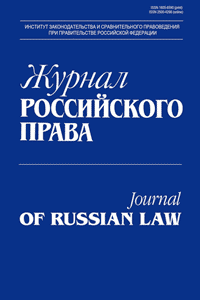Based on the problem situation conditioned by indeterminacy of institutional position of the standards of law enforcement ethics within the mechanism of contemporary law enforcement regulation, the author attempts to analyze the legal nature of the above standards. The study reveals that the legal nature of standards of law enforcement ethics is conditioned by the necessity to protect the identity of citizens and the law enforcement system itself from the negative impact produced by various forms of irregular conduct by subjects of law enforcement. As a result of comparing the standards of law enforcement ethics and the rules of law the author establishes that according to the technical-legal forms of their external expression and other attributes, as well as their regulatory potential, the standards of law enforcement ethics are comparable to the status of the rules of law. The study permits us to conclude that the standards of law enforcement ethics possess the classificatory identity typical of the protective rules of law represented by relations in the field of law enforcement activity. This identity is conditioned by the specificity of the subject of their regulation. The standards of law enforcement ethics are of subsidiary significance as they supplement and develop standards of status laws in matters of legal regulation of the moral aspect of the law enforcement activity.
Rules of law, law enforcement, legal nature, standards of law enforcement ethics, professional ethics code, irregular conduct.
1. Alekseev S. S. Obshchie dozvoleniya i zaprety v sovetskom prave. M., 1989.
2. Valiev R. G. O znachenii kontsepta «pravovaya institutsionalizatsiya». Yuridicheskaya nauka i praktika: istoriya i sovremennost´: sb. mater. I Mezhdunar. nauch.-prakt. konf. 5 iyunya 2013 g. / otv. red. I. V. Pantyukhina. Ryazan´, 2013. Vyp. 1.
3. Vlasenko N. A. Razumnost´ i opredelennost´ v pravovom regulirovanii: monografiya. M., 2014.
4. Distsiplinarnaya praktika Advokatskoy palaty Ul´yanovskoy oblasti: sb. mater. / sost. N. M. Kipnis. M., 2009.
5. Ivanchenkov Yu. V. Eticheskie pravila povedeniya advokata v ugolovnom protsesse. Yurist. 2011. № 21.
6. Karpov N. Nravstvennye osnovy prokurorskoy deyatel´nosti. Zakonnost´. 2008. № 12.
7. Komissarova E. G. Formal´no-logicheskie aspekty ponyatiya «pravovaya priroda». Vestnik Permskogo universiteta. Yuridicheskie nauki. 2012. № 2.
8. Livshits R. Z. Teoriya prava. M., 1994.
9. Mel´nichenko R. G. O probleme smesheniya pravovykh i moral´nykh norm v kodekse professional´noy etiki advokata. Zakon. 2012. № 9.
10. Nenovski N. Pravo i tsennosti / Vstup. st. i per. s bolg. V. M. Safronova; pod red. V. D. Zor´kina. M., 1987.
11. Obolonskiy A. V. Etika i otvetstvennost´ v publichnoy sluzhbe. Voprosy gosudarstvennogo i munitsipal´nogo upravleniya. 2015. № 1.
12. Sakharov A. V. Ponyatie i pravovaya priroda regressnogo obyazatel´stva. Yurisprudentsiya. 2009. № 4.
13. Skakun O. F. Teoriya gosudarstva i prava: uchebnik. Khar´kov, 2000.
14. «Spyashchiy sud´ya» uvolitsya. URL: http://www.rg.ru/2013/01/30/reg-dfo/mahno.html.
15. Sud´ya prospal kar´eru. Gazeta. ru. URL: http://www.gazeta.ru/social/2013/02/01/4949433.shtm.
16. Transportnyy prokuror Tyndy, obeshchavshiy opponentu «bez bazara podtyanut´ svoyu bratvu», uvolen. URL: http://pravo.ru/news/view/82749/.
17. Fogel´son Yu. B. Myagkoe pravo i verkhovenstvo prava. Zhurnal rossiyskogo prava. 2014. № 11.








